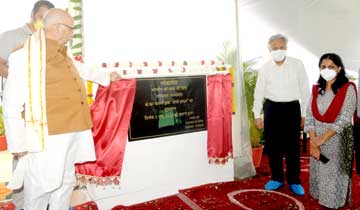Raj Bhavan should present ideal of biodiversity and organic farming: Lalji Tandon
Bhopal : Governor Shri Lalji Tandon has issued directives that attractive and self-sufficient parks should be developed as tourism centres in Raj Bhavan, Bhopal and Pachmarhi. The visitors of Raj Bhavan should get information and inspiration of biodiversity of Madhya Pradesh, gardening with modern organic method and beneficial and self-sufficient cultivation of fruit and flower gardens. He said that chemical fertilizers should not be used in Raj Bhavan. Manure and pesticides should be made for agriculture and horticulture crops using organic and natural elements like garbage, cow-dung, gou-mutra, etc. available in Raj Bhavan. Shri Tandon was holding a discussion with the officers of Horticulture Department after the inauguration of poly house for protected farming organized on the occasion of World Environment Day. Principal Secretary Horticulture and Food Processing Smt. Kalpana Shrivastava, Secretary to the Governor, Shri Manohar Dubey, Commissioner-cum-Director Horticulture Shri Pushkar Singh and other officials were present on the occasion.
Shri Tandon said that the fruit and flower gardens of Raj Bhavan should be developed as ideal gardens, so that they become centres of attraction of tourists. Self-reliance should be the basis of construction and operation of the gardens. He said that all the work should be done in a demonstrative manner so that by seeing them, others will get information and are inspired to work. They will practically see modern, organic and horticultural methods and see varieties of fruits and flowers benificial for horticultural crops. Efforts should be made to produce organic manures and pesticides as well as production of Indian earthworms (kechua) for self-sufficiency. The earthworms used in the present vermi compost only convert dung and others into manure. Whereas Indian earthworms help in increasing the productivity of agricultural land. The native earthworms soften the soil for agricultural use in the process of moving deep down the soil. Similarly, the use of sterilized and densely sterilized fertilizers in irrigated areas and non-irrigated areas increases the productivity of the land significantly. The manufacturing process is very simple. It can be prepared in a drum by mixing a little gram flour and jaggery with cow dung, cow urine. It can be used through the water drains in irrigated areas and by dry spraying in non-irrigated areas.
Governor Shri Tandon said that best form of horticulture should be developed at Raj Bhawan Bhopal and Pachmarhi. Its detailed plan should be created. A practical form of organic farming, zero budget farming should be prepared. Training facilities should also be provided here, which should provide information about the use of organic products in place of chemical pesticides, fertilizers. Practical knowledge related to the simple process of manufacture and low cost should be made available. The Governor said that the requirements of the Raj Bhavan should be met from the resources of Raj Bhavan. Indigenous improved breeds of cows have been reared in the gaushala at Raj Bhavan. Gaushala is also the pilot project of indigenous breed improvement programme, along with supplying the dairy product requirements.
The Governor was told that the Raj Bhavan Poly House will produce vegetables throughout the year. The crop productivity will also be manifold due to cultivation in controlled environment in the poly house. It is also free from pest related diseases. Production of organic vegetables will take place. To control the use of chemicals and pesticides, a practical form of protected and traditional farming has been designed. Residents of urban areas can grow vegetables according to their need without soil with this modern method. The Governor was told that the Raj Bhavan has become self-sufficient in the use of vegetables, milk, organic manure and pesticides. For the kitchen, most of the vegetables, milk, ghee, curd, buttermilk, fertilizer, pesticides etc. will not be purchased from the market.
It may be noted that 150 saplings of high brid tomato have been planted in the poly house. These will produce an estimated 7.5 quintals. Similarly, 255 cucumber saplings expected to produce 10 quintals have been planted. There are 80 saplings of capsicum which will produce about two and a half quintal capsicum. He said that the average production of green leafy vegetables in the poly house is about two to three kilograms per square feet. Fenugreek, spinach, chaulai, lal bhaji are planted in 146 sq ft each and coriander in 292 sq ft in the poly house of Raj Bhavan.

